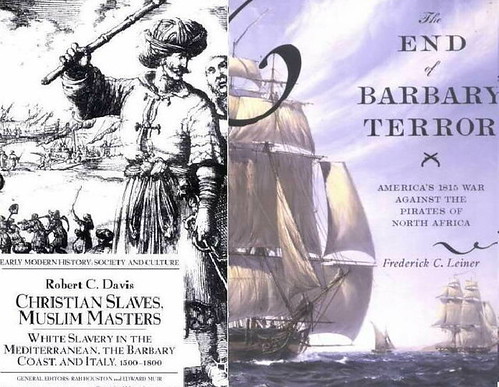“Old pirates, yes, they rob I, sold I to the merchant ships…”

Even before last week’s capture and subsequent rescue of Capt. Richard Phillips, reports of pirate activity off the Horn of Africa had been in the news for years. The International Maritime Bureau of the ICC maintains a real-time Live Piracy Map, which provides locations and information on attacks throughout the world.
While Somali seafarers are relatively new to the plundering scene, the Berbers, their Maghreb counterparts west of the Nile Valley, had a long history of menacing European vessels, and not only vessels but coastal towns too.
I was born in Co. Cork in Ireland, not far from the scenic seaside town of Baltimore, which, on June 20th, 1631 was the scene of:
“…one of the biggest single captures of innocents by pirates anywhere in Europe. The night-time raid was also seen as an audacious incursion on what was the King’s territory.”
In what became known as the Sack of Baltimore, 108 English and Irish villagers were taken away by Algerian pirates led by a “Dutch captain turned pirate, Jan Janszoon van Haarlem, also known as Murat Reis the Younger.” This was just one instance of European Christian slaves being captured by Muslim pirates and slave traders.
In his book Christian Slaves, Muslim Masters: White Slavery in the Mediterranean, the Barbary Coast and Italy, 1500-1800 Robert C. Davis, Professor of History at Ohio State University, claims that,
“between 1 million and 1.25 million European Christians were captured and forced to work in North Africa from the 16th to 18th centuries.”
Fast forward to the beginning of the 19th century. With increased maritime traffic in the Mediterranean Sea, the Barbary pirates (as they were known then) didn’t need to travel far in search of loot and hostages. Britain and France had agreements in place with the Regencies of Algiers, Tunis and Tripoli to pay “tribute” to ensure safe passage for their vessels.
“However, by 1783 America became solely responsible for the safety of its own commerce and citizens with the end of the Revolution. Without the means or the authority to field a naval force necessary to protect their ships in the Mediterranean, the nascent U.S. government took a pragmatic, but ultimately self-destructive route. In 1784, the United States Congress also allocated money for payment of tribute to the Barbery pirates, and instructed her British and French ambassadors (John Adams and Thomas Jefferson, respectively) to look for opportunities to negotiate peace treaties with the Barbery nations.” - The First Barbary War
Negotiations failed, and with the United States deep in debt after a long and costly war at home, Adams and Jefferson decided they would have to pay up until such time they could rebuild the strength of their navy.
The first Barbary War started in 1801 when the pirates wanted a pay raise from the new Jefferson administration. The President balked, the pirates plundered and we had a bloody naval battle on our hands. In fact the Tripolitan War, as it was also known, was the United States’ first foreign war. After 4 years it ended in a draw, a prisoner exchange and a treaty. Here’s the part of the text:
“The Bashaw of Tripoli shall deliver up to the American Squadron now off Tripoli, all the Americans in his possession; and all the Subjects of the Bashaw of Tripoli now in the power of the United States of America shall be delivered up to him; and as the number of Americans in possession of the Bashaw of Tripoli amounts to Three Hundred Persons, more or less; and the number of Tripolino Subjects in the power of the Americans to about, One Hundred more or less; The Bashaw of Tripoli shall receive from the United States of America, the sum of Sixty Thousand Dollars, as a payment for the difference between the Prisoners herein mentioned.” - Treaty Of Peace and Amity between the United States of America and the Bashaw, Bey and Subjects of Tripoli in Barbary.
There were 10 war-free years during which occasional ransoms were paid as opposed to regular “tributes”. Then in 1815 the Second Barbary War started and ended the same year. This time victory for the US was emphatic, with a little help from the British navy.
In the following decade and a half there were sporadic attacks against European and American vessels. However, a side effect of France’s brutal invasion of Algeria in 1830, was that piracy stopped completely. Somehow, I don’t suppose there’s much chance of Barack Obama ordering US troops into Somalia to weed out the pirates there any time soon.
16 notes
 perles-pyla-blog liked this
perles-pyla-blog liked this  livraison-de-courses-blog liked this
livraison-de-courses-blog liked this  dao-lyrics-com-blog-blog liked this
dao-lyrics-com-blog-blog liked this africafeed posted this
